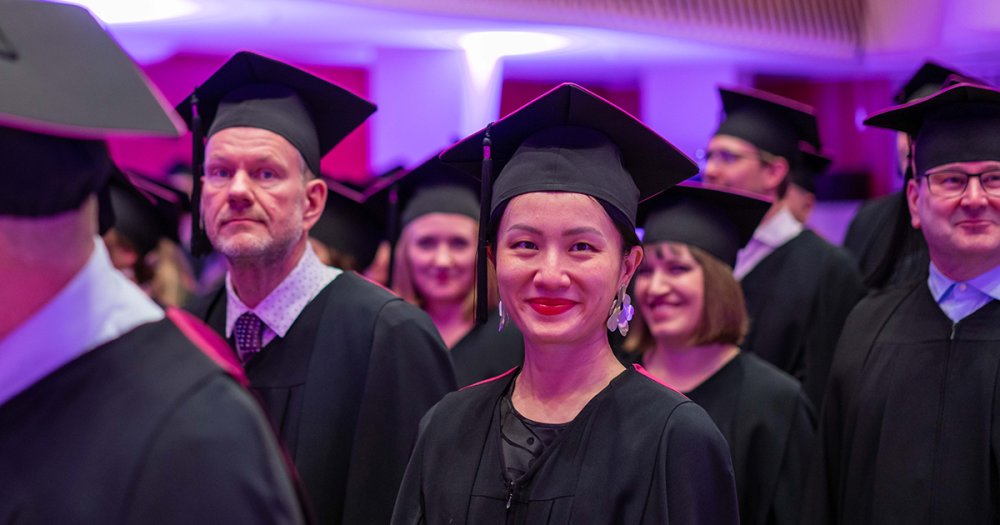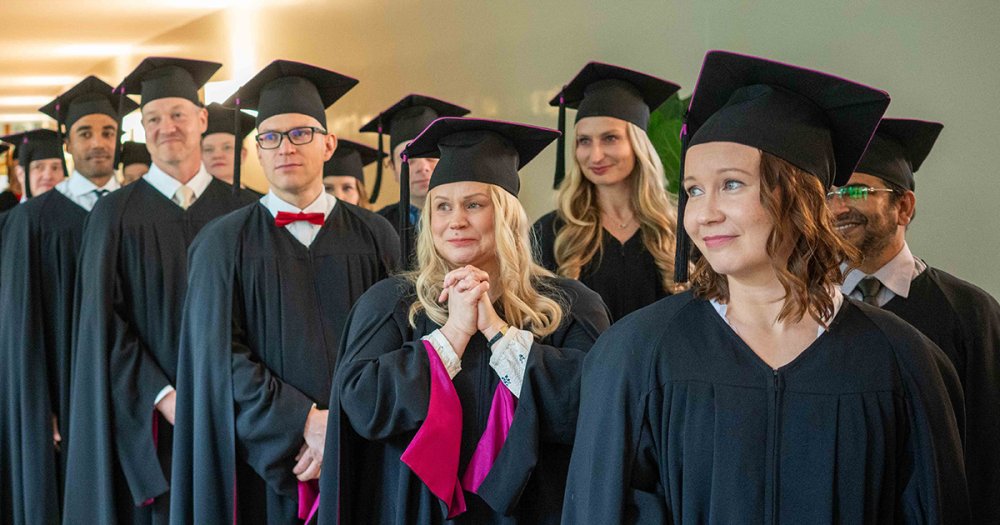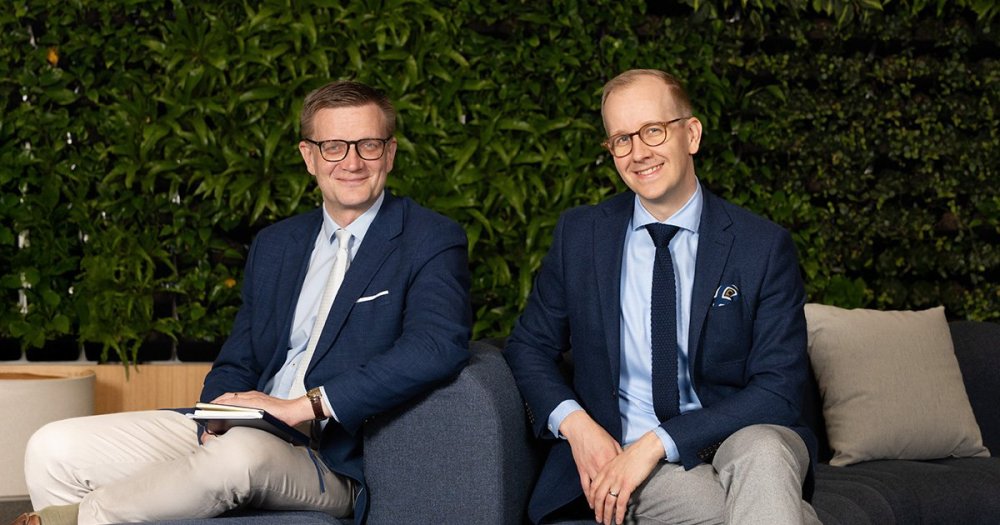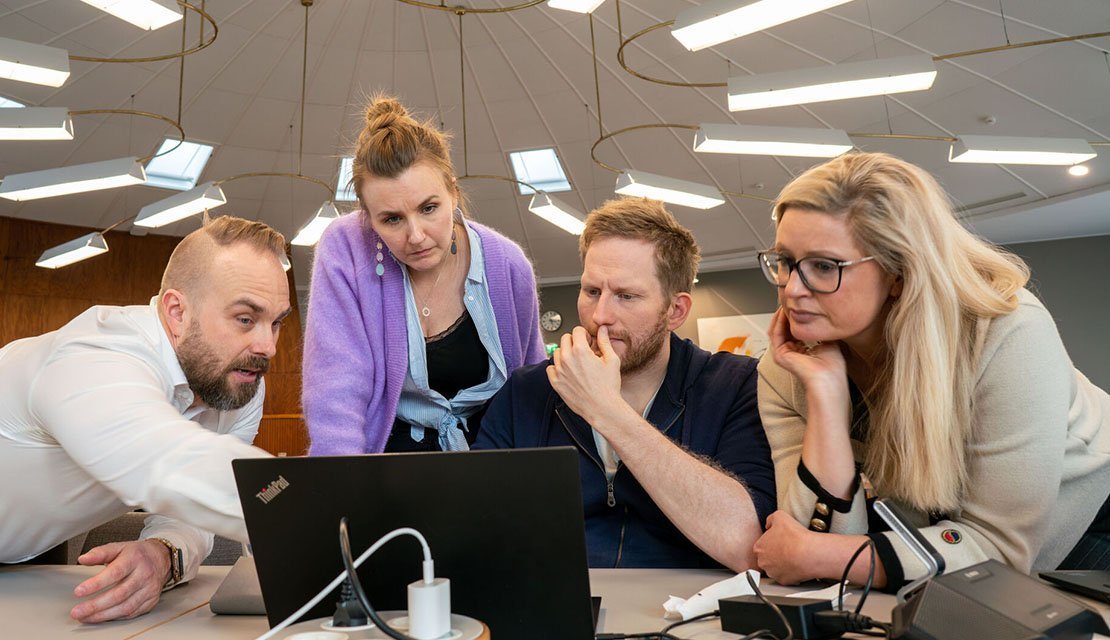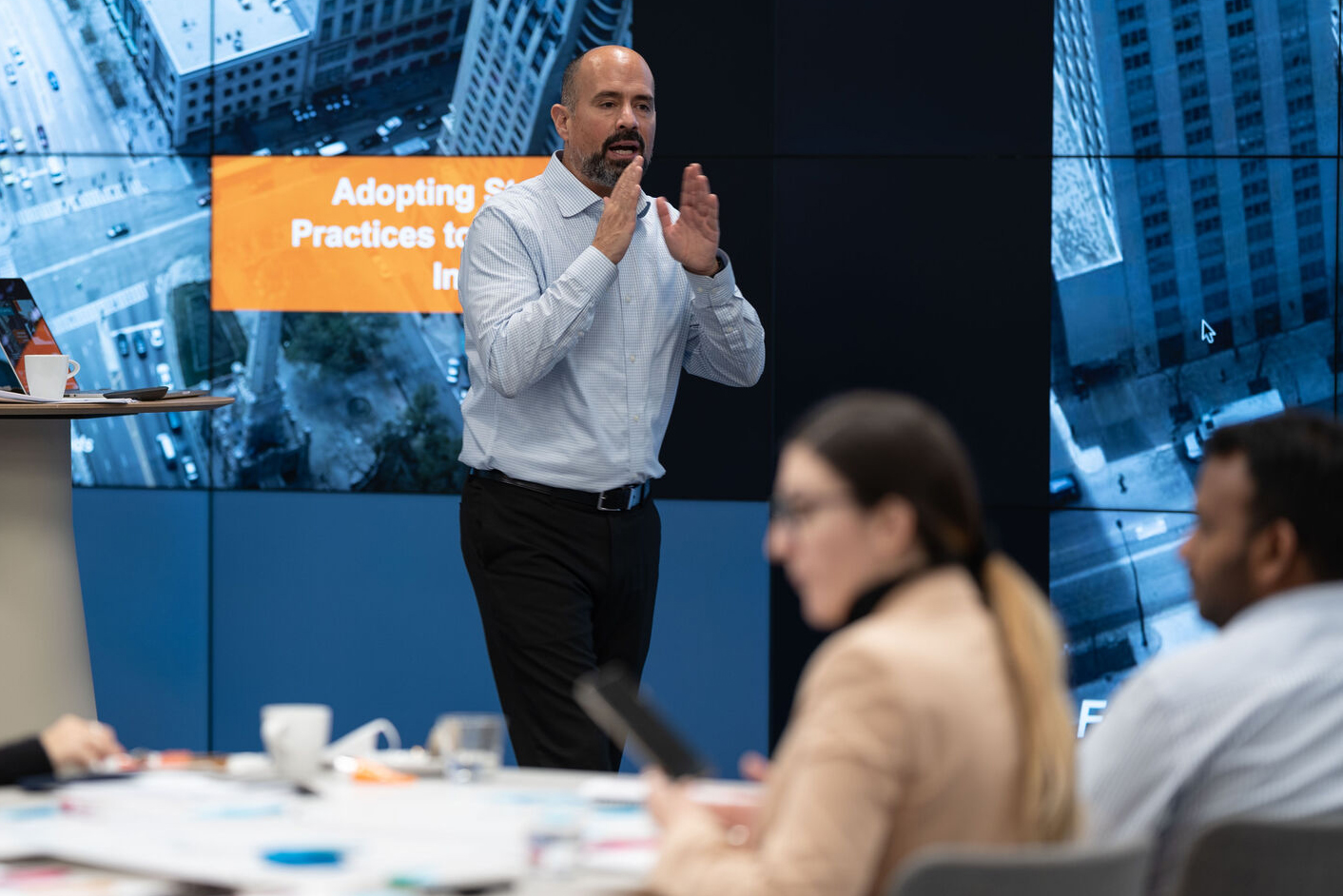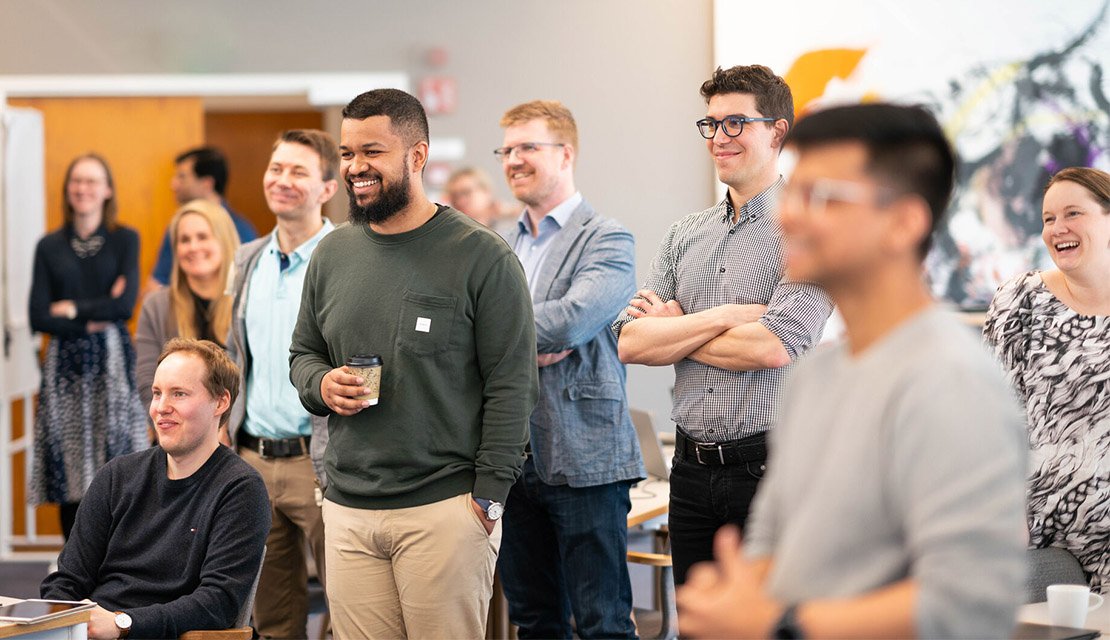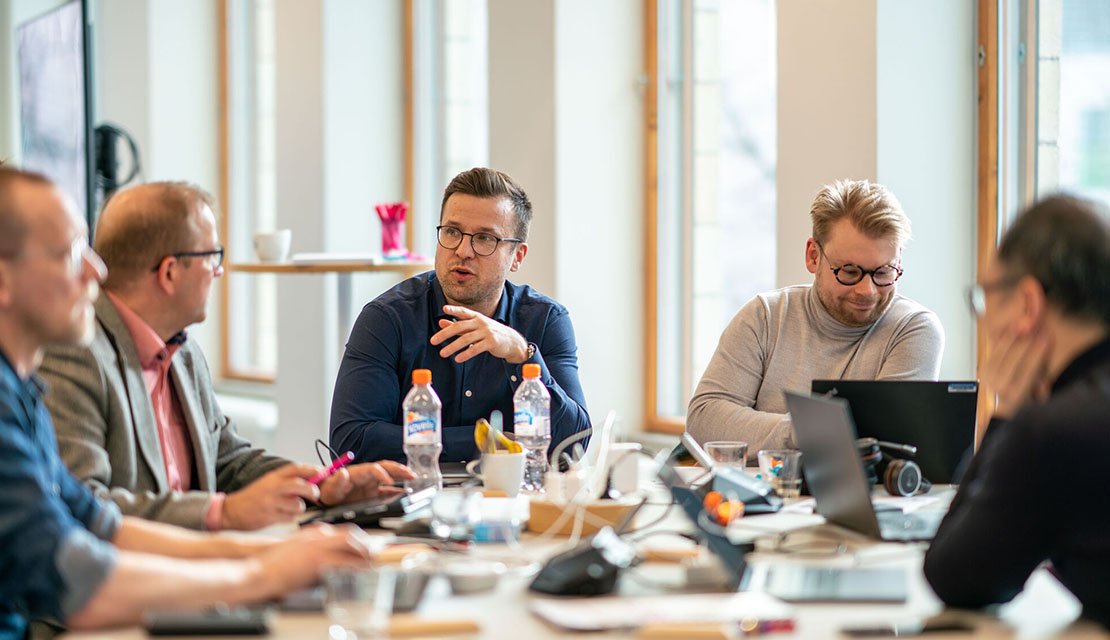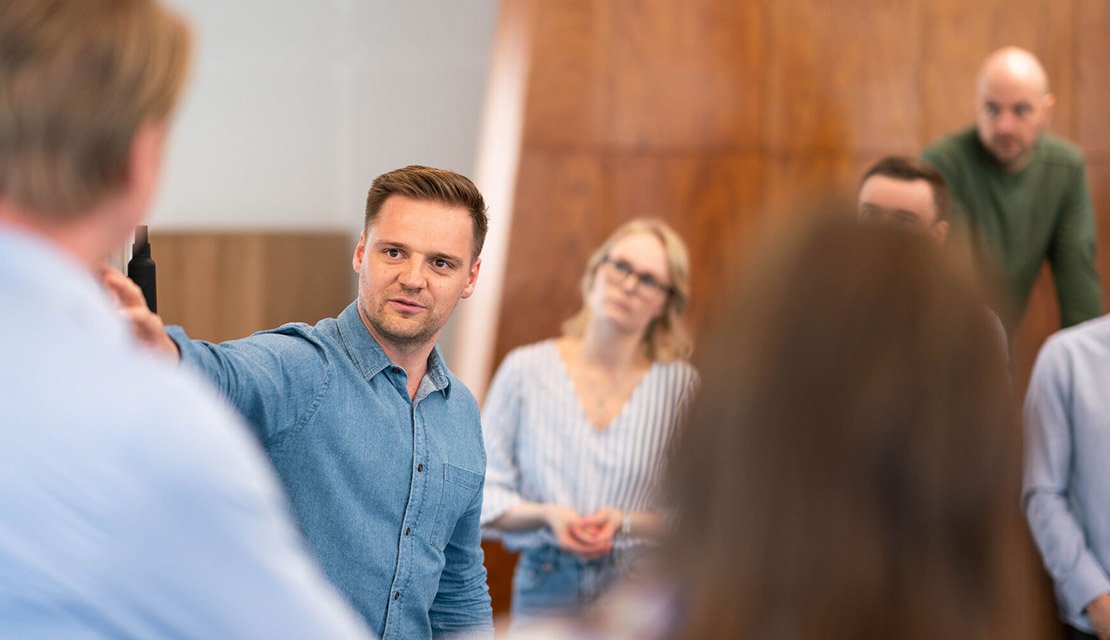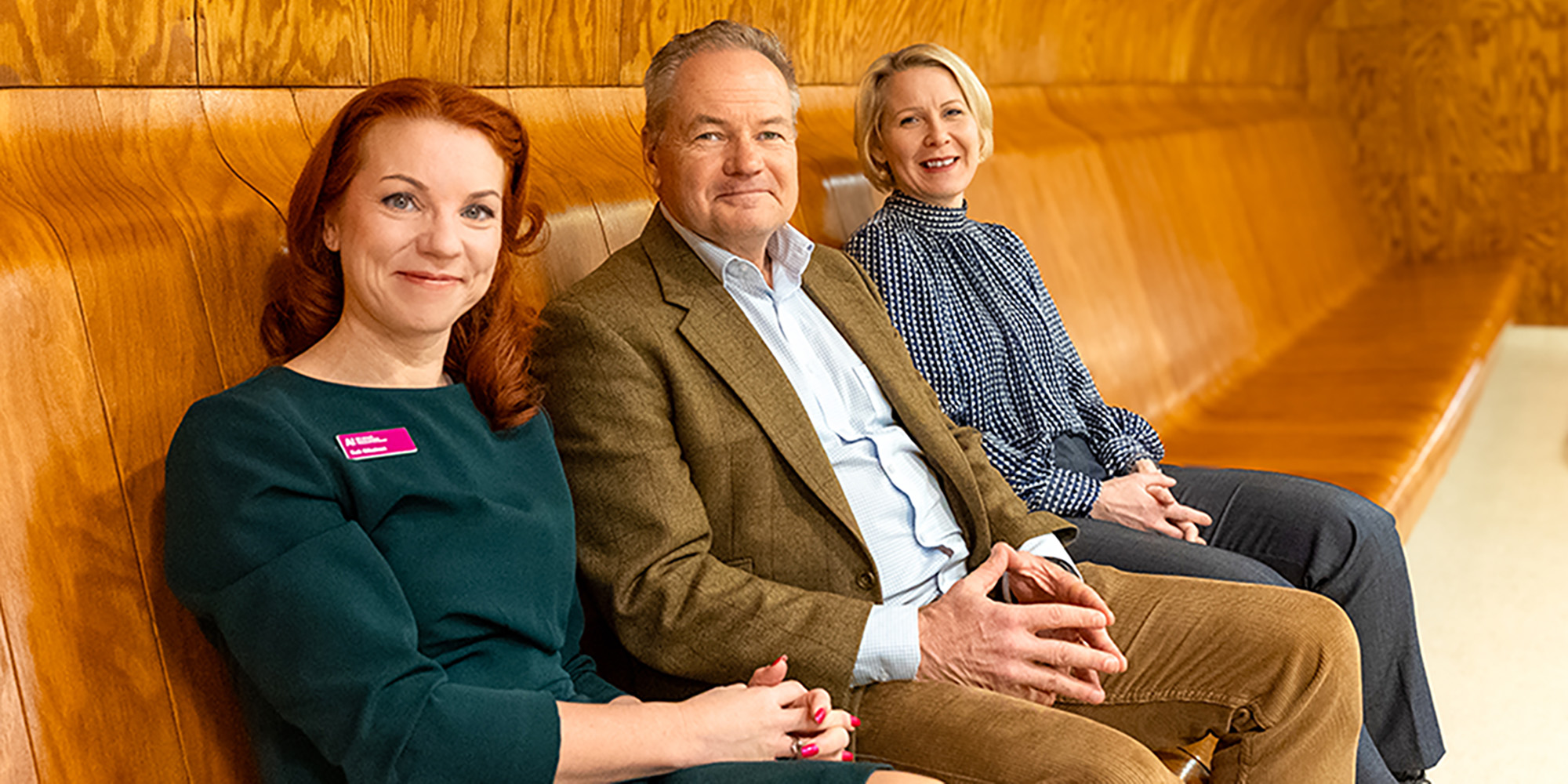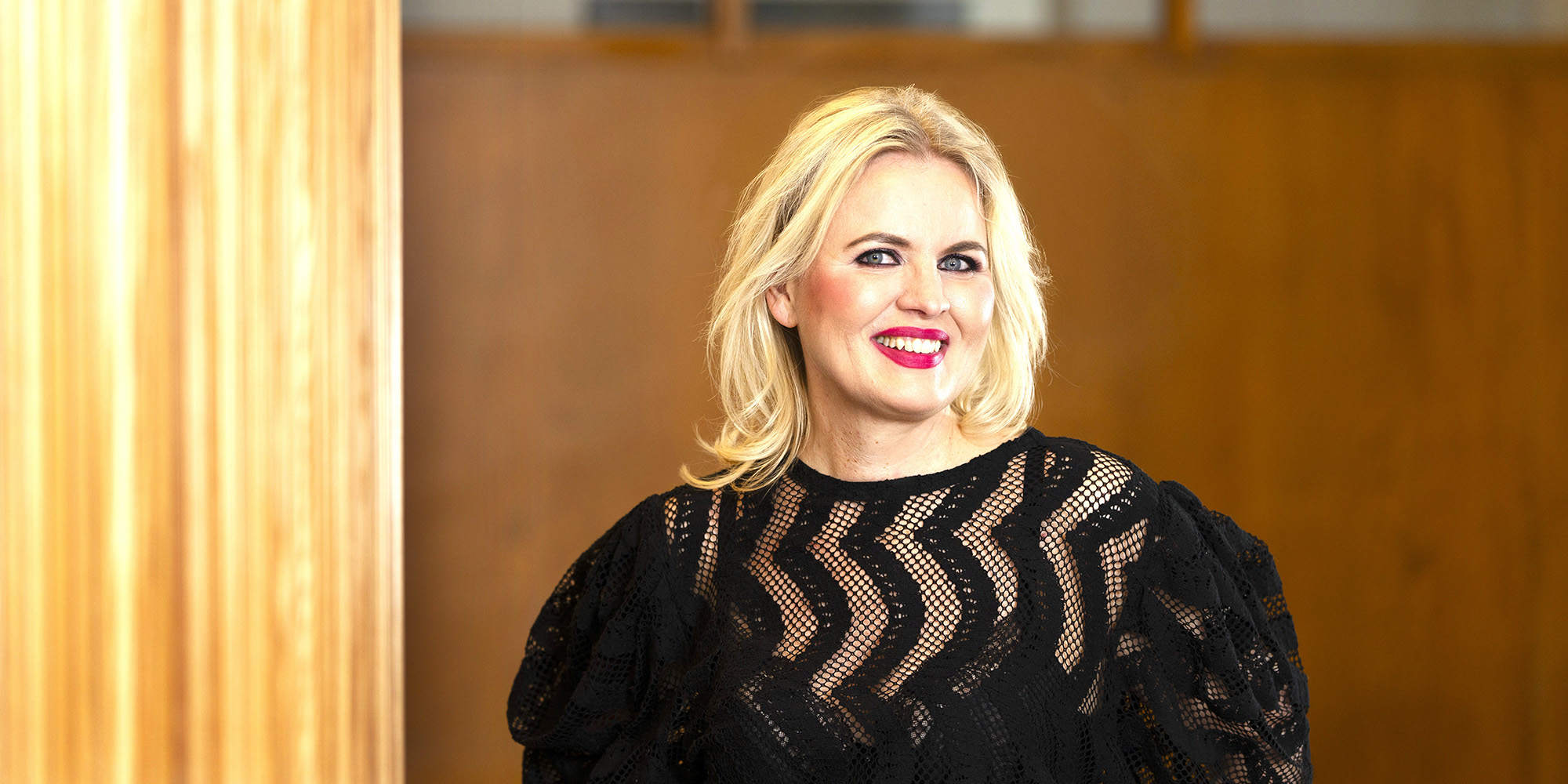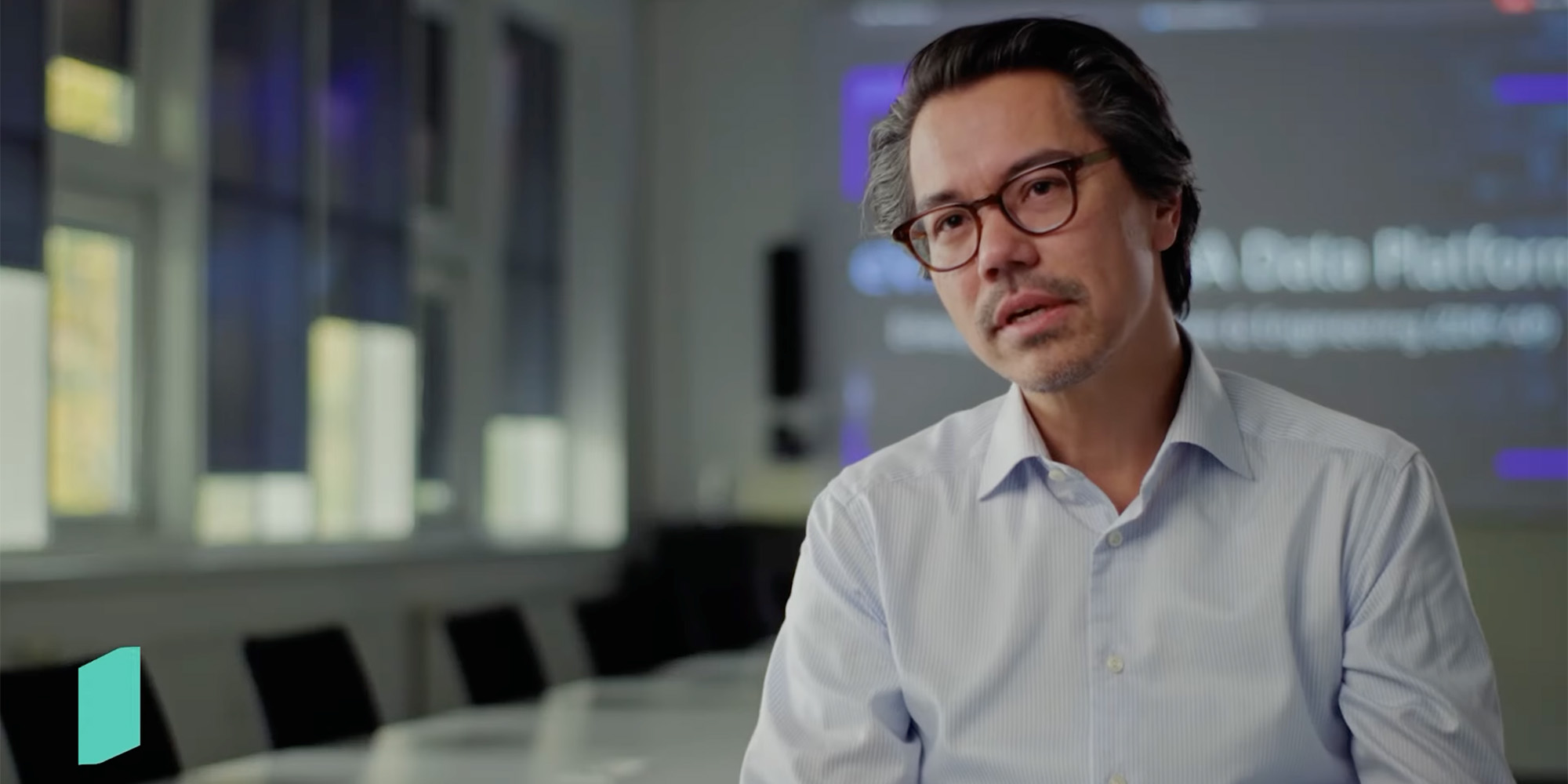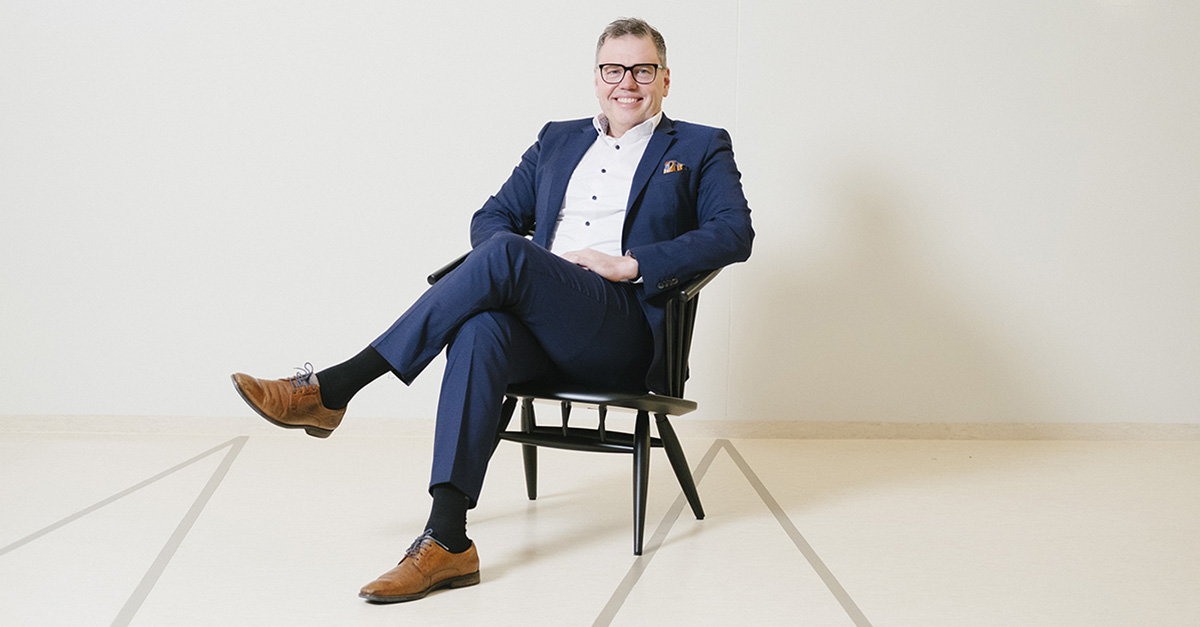Joyful chatter fills the room on the third floor of the Aalto University Töölö building on a sunny Friday morning in March as the Aalto MBA 2022 participants are getting ready for the third day of the Scaling-up Business module.
The day starts with reflections on the previous day's sessions. The lively and enthusiastic discussion is led by Aalto EE's Senior Advisor, Dr. Fabian Sepulveda, this module's head instructor, who has also been instrumental in designing its content
It soon becomes evident that a lot of hard work has gone into the preparations. In addition to lectures, the four-day module includes group discussions and projects, simulations, practical live cases, and meetings with guest speakers from the business world.
MBA and EMBA programs are more closely linked to practice than undergraduate studies."
"If it's been a while since your own studies, it may come as a surprise that studying at the university has changed. And let's not forget the fact that MBA and EMBA programs are more closely linked to practice than undergraduate studies," says Dr. Mikko Laukkanen, Academic Director at Aalto EE.
"Our teaching methods are often based on small-group work. We may look at case examples and talk about them or reflect on a particular challenge in the context of each participant's own job. We also regularly use roleplay simulations where the participants assume the role of a decisionmaker and try to figure out how to solve the case example with the information they've been given and the interests associated with the role they're playing," Laukkanen says.
In Aalto EE's programs, the solid academic foundation is closely linked to practice, an approach that is unmatched even on a global scale. Each lesson is based on the latest research, but the participants have the opportunity to immediately apply their new skills and knowledge to real life and their own work. Another benefit of the wide range of teaching methods is that it accommodates different learning styles.
"Our teaching methods are so versatile that everyone is sure to find their own way to take in new information. On the other hand, we also push people outside their comfort zones to try out new things so that they sink in more easily," says Kerttu Kuokkanen, Director of MBA Programs at Aalto EE.
Sumit Shah, one of the MBA participants, concurs. He works as Application Technical Manager at the management consulting firm Paja Finanssipalvelut. Shah says the assigned articles and case studies help in creating a skeleton, but the bones need some meat around them. This meat is added by group discussions and projects, keynote speeches, and live cases.
"As for my favorite method, I would lean towards the collaborative sessions, as in them, I get to expand my thoughts and learn from the experiences and perspectives of my fellow participants. This, to me, is of equal importance and lives longer in my head than any theoretical concept," Shah says.
|
|
Critical thinking allowed
Fabian Sepulveda enriches his lectures with videos, exercises, and discussions, and the participants don't shy away from commenting, posing questions, or challenging the views floating around.
"The small exercises utilizing a certain framework, meant to revise what we've learned, are quick to do and effectively facilitate discussions. They are very useful," says one MBA participant when asked to reflect on the day.
"When we redesigned the module's curriculum, we thought long and hard about what would be relevant for today's leaders and start-up entrepreneurs and what they would be interested in learning after the start-up phase," says Program Director Anne Nylund during a coffee break.
In point of fact, one of Nylund's greatest sources of joy at work is that there is always more redesigning and developing to be done when it comes to the program and its modules. "We always keep getting ideas on how to do things even better next time, what to have more of and what less. We have to keep our eyes and ears open."
The diversity of the participants brings its own challenges. After all, the goal is for everyone to find something relevant to themselves in each module, learn something new, and gain fresh ideas and insights to support their work. On the other hand, the wide spectrum of participants in the open enrollment programs is also one of their greatest advantages.
"We aim to leverage the expertise within the group and bring new perspectives to existing experience and knowledge," says Mikko Laukkanen.
It adds a whole new layer when a participant mentions, 'We have done it this way; have you considered this?' The process of doing and learning is very holistic."
Nylund emphasizes that by reflecting and discussing things together, the participants can reach a completely different level compared to just reading books alone or following online lectures, for example.
"It adds a whole new layer when a participant mentions, 'We have done it this way; have you considered this?' The process of doing and learning is very holistic. We don't aim for a single truth but value critical thinking and reflection," says Nylund.
The participants of the Scaling-up Business module also mention this as one of the best aspects of the program.
"People come from a wide range of companies, some from large corporations, some from small family businesses, and others from somewhere in between. It brings wonderful diversity to the discussions," says Anna-Liisa Murros, CEO of ICF Group, a supplier of healthcare equipment and products.
"We don't come here for four days just to listen to lectures; we are constantly learning from each other as well," agrees Ruut-Maaria Rissanen, Director, Regional Land Use Planning at the Council of Tampere Region.
|
|
The live case method ensures up-to-dateness
Scale-ups are high-growth companies with the potential to establish a strong position in global markets. Despite the strong start-up ecosystem in Finland and the other Nordic countries, only a few promising start-ups succeed in scaling up, creating new jobs and prosperity. Making the leap requires courage and risk-taking, as well as an operating environment and corporate culture that foster growth. Additionally, the company's processes, practices, and hierarchy need to adapt to scaling."
"For scale-ups, vision is important. It guides in the right direction," emphasizes Sepulveda during his Friday morning lecture. Prominent names and familiar tools, from Jeff Bezos to Simon Sinek and his Golden Circle, are projected on a screen, not to forget customer-centricity, of course.
In the Scaling-up Business module, participants delve into the unique nature of high-growth companies, the key risks and challenges facing them, as well as strategies for effectively leading, accelerating, and managing explosive growth. The teaching has a solid scientific foundation, but it is anchored in practical work and reality through visits from industry influencers, who openly share their own experiences and discuss a relevant challenge that aligns well with the module's theme.
According to Laukkanen, live cases are a great way to bring contextual variation and relevance to the studies. Not only do participants benefit from them, but they are also of service to the case companies themselves, provided that the assignment is well-planned. "After all, the companies receive free consultation from experienced business leaders," he remarks.
The live case projects provide an opportunity to apply to practice the theoretical concepts taught during the module. They expose us to different industries and the satisfaction of contributing to a real business."
In this module, the live cases come from the Finnish technology scale-ups Treamer, Askem, Zapflow, and Falcony. The participants were divided into eight small groups in advance, with each group focusing on one visiting company.
The task is to familiarize with the company beforehand, conduct an hour-long interview with the company representative, analyze the company's current state and challenges, and propose the next actions for scaling up its operations. Additionally, each participant will independently prepare a final assignment on the live case company after the completion of the module. They can also select another scale-up company that they know well.
"The live case projects provide an opportunity to apply to practice the theoretical concepts taught during the module. They expose us to different industries and the satisfaction of contributing to a real business. The live cases also provide a practical experience of how different concepts can be in theory and in practice. Getting feedback from the professionals and business experts has been most enlightening," says Sumit Shah.
A business influencer in the hot seat
On Friday morning, Sepulveda distributes questionnaires to the groups to prepare for the interviews. "Treat the company representatives ruthlessly and don't be afraid to provide criticism. They appreciate it," he advises. No need to handle the interviewees with kid gloves then.
The interview takes place after the lunch break. Two of the small groups stay in the lecture hall to squeeze answers from Falcony's Konsta Vesterinen. They have clearly taken Sepulveda's instructions to heart, as the questions are tough. What is actually your company's strategy? Where do you find new customers? What happens if you suddenly get a million new customers? How does it scale? What happens to customer service? What is your personal driver? Let's imagine this is five years from now, and you've been a big success. What are the likely steps that have led to that success? What is the glue that keeps your founding team together? What is the main reason for customers to deny your offer?
The interview is good, lively, vibrant, and active. Vesterinen responds to the participants' questions in a surprisingly open and thoughtful manner, and follow-up questions are flying around.
Later in the afternoon, participants engage in analytical discussions about the interview and the insights it has generated. Reflection is honest, and laughter fills the air. Preparation for Saturday's presentation has begun.
|
|
Before that, however, it's time for Friday afternoon's two keynote lectures. In person at Aalto University's Töölö campus in Helsinki, Rafal Modrzewski, the CEO of the Finnish aerospace technology company Iceye talks about how an idea born from Aalto University's CubeSat program grew into a company worth hundreds of millions of euros, with its radar satellites considered the best in the world.
The second keynote presentation is given by Valtteri Vesikallio, Senior Vice President of Global Services at the US-based Hyland Software, via a video connection from his home in Ohio. He delves into data and metrics, as well as organizational structure and culture.
After the presentations, it's question time. At least ten hands immediately shoot up, and there is no sign of the typical Finnish reticence.
"I really appreciated the keynotes from world-renowned business leaders who not only openly shared their first-hand experiences but their lessons learned as well, which is critical for learning," says Lucja Wanicka, Consultant at AFRY Management Consulting, a leading advisor for the transitions of the energy and bioindustry sectors.
Discussion continues during coffee breaks
Saturday morning starts off much like Friday, with a review of the previous day's topics. The conversation meanders, participants engage in an enthusiastic debate, and laughter spreads around the room again. An exchange of thoughts on the two sides of leadership – leaders, and managers – ignites particular passion, as does the evaluation of each participant's personal characteristics.
The insights shared by Aalto EE's Senior Advisor Ben Nothnagel during a previous module have clearly struck a chord. The discussion becomes so enthusiastic that Sepulveda eventually has to interrupt it to prevent the schedule from falling behind too much.
"I love this debate! This has definitely been the best discussion in these four days," he nevertheless says, sounding satisfied, happy, and enthusiastic. Motivated participants are probably the instructor's best reward.
The Saturday morning is spent discussing topics such as organizational culture, building trust, and team dynamics. “How do we get the most out of our people” is the wrong question. We should ask, “How do we create an environment where our people can do their natural best?" declares Simon Sinek in a video.
Sepulveda presents the Dutch chocolate manufacturer Tony's Chocolonely as an example of a company that has genuinely invested in creating just such an organizational culture. It seems it is actually possible.
Coffee breaks last longer than planned as the topics discussed throughout the day spark spontaneous conversations. Partly to blame is the coffee machine, which only brews one cup of specialty coffee at a time. With twenty people in line waiting for high-quality coffee, minutes pass by.
While you can go fast alone, perhaps it's wiser to go further together. After all, business is a team sport."
However, the significance of the discussions should not be underestimated, even if they may disrupt the schedule. Lucja Wanicka emphasizes that there's a need for more open dialogue and knowledge sharing in the business world, too.
"Many of the instructors emphasized the importance of mentors and sponsors. Since we as individuals learn best from each other, knowledge sharing needs to be encouraged not only across divisions but also across organizations and industries. So, when scaling up a corporate venture or start-up, make a conscious choice to reach out for help and guidance. While you can go fast alone, perhaps it's wiser to go further together. After all, business is a team sport," she says.
The group's support is vital
Saturday is mostly spent on the live cases. As the clock approaches noon, the small groups scatter throughout the iconic Aalto University Töölö building to prepare their presentations, squeezing in a lunch break somewhere in between.
The module culminates in live case presentations. There is a sense of excitement and anticipation in the air. This is likely one of those moments when some of the attendees are forced to step outside their comfort zones. Fortunately, collective support carries them through. In a familiar group, everyone feels confident enough to venture into unfamiliar territory.
|
|
Sepulveda provides real-time feedback on the presentations, as does the other small group that has analyzed the same company. The discussion remains friendly and respectful, valuing different perspectives while also being lively and dynamic.
"We would spend these four days talking among ourselves if someone didn't rein us in, guiding the activities," Ruut-Maaria Rissanen laughs.
For her, the past few days have been intense and inspiring. There has been a lot of learning, and numerous thoughts have emerged. Also, another participant expressed gratitude for the discussions and the way the module has been constructed.
"There have been many great speakers, each with partially similar and partially different topics, which enriches the conversation with multiple perspectives. The days have gone fast, progressing in a structured manner," he says.
It seems that Fabian Sepulveda's primary goal for the module has been achieved. "I hope that you walk away with at least a little bit of inspiration from this course. That is really important to me," he says as his final words of the day.
Aalto EE offers two MBA programs: Aalto MBA and Aalto Executive MBA (EMBA), where participants experience a journey of transformation, including elements of personal leadership transformation as well as business and organizational transformation. Read more







